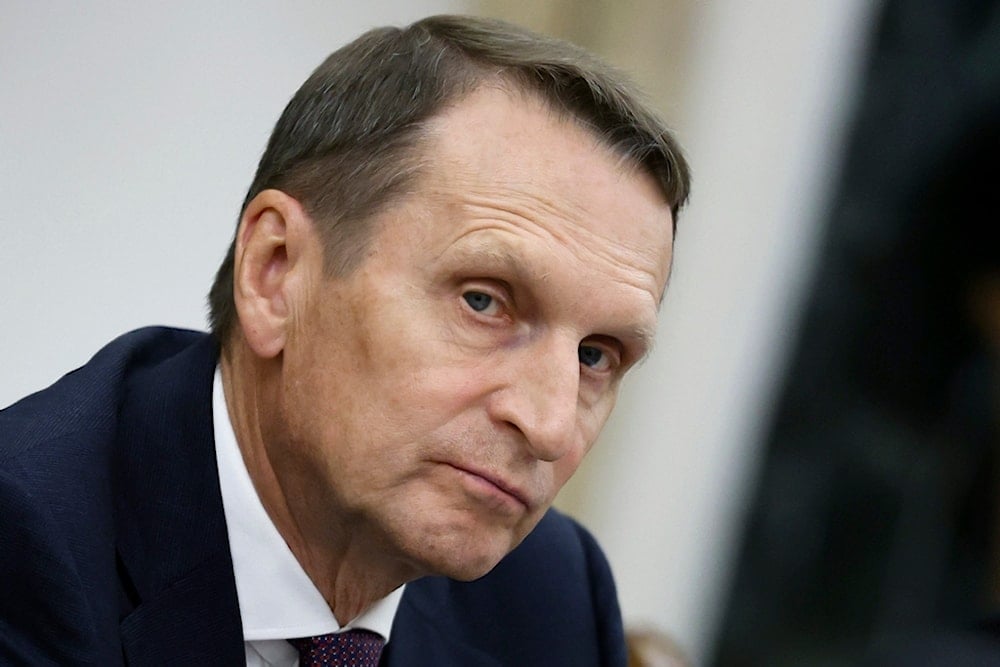UK, NATO plotting sabotage of Russian oil tankers, says SVR
The SVR accuses the UK and NATO of planning a tanker sabotage to justify crackdowns on Russian oil shipping and push Trump into harsher secondary sanctions.
-

Russian Foreign Intelligence Service chief Sergei Naryshkin attends the Security Council meeting on nuclear deterrence with Russian President Vladimir Putin at the Kremlin in Moscow, Russia, Wednesday, September 25, 2024 (AP)
Russia’s Foreign Intelligence Service (SVR) claimed on Monday that British intelligence services, in coordination with NATO allies, are planning a large-scale sabotage operation targeting the so-called "shadow fleet" of tankers transporting Russian oil.
According to a statement released by the SVR, London allegedly aims to engineer a high-profile incident involving one or more tankers to justify an aggressive Western crackdown on vessels carrying Russian crude. The move, Moscow warns, could severely disrupt international maritime commerce.
"According to information received by the SVR, UK special services plan to use their NATO allies to launch a major raid on the 'shadow fleet.' According to London's plan, such a campaign should be triggered by a high-profile incident with one or more tankers," the agency said.
UK plans to mark Russian oil shipments as threat
The Russian intelligence service alleged that London’s strategy includes a staged accident involving a targeted tanker in a key maritime chokepoint, such as a strait, or even setting a vessel ablaze in the port of a country friendly to Moscow, in an effort to trigger an international response and damage local infrastructure.
The SVR further claimed that Ukrainian operatives may be assigned to execute these anti-Russian provocations on behalf of British intelligence.
"At the extreme, this could mean detaining any ‘suspicious’ vessels in international waters and escorting them to the ports of NATO states," the statement added.
The goal of such an incident, according to the SVR, would be to portray Russian oil shipments as a global security threat, thereby granting Western nations the political cover to escalate sanctions and maritime interdictions. The timing of the operation, the agency said, would be carefully selected to maximize media exposure and increase pressure on the Trump administration to tighten secondary sanctions on Russian energy buyers.
Public enemy #1
Reuters reported in March that Russia now views Britain as its primary enemy, citing three Russian officials speaking on the condition of anonymity.
This title was reportedly earned after two British diplomats were expelled from the country over espionage charges, a ferocious statement from Russia's SVR calling Britain "a warmonger", and a threat from a top ally of Vladimir Putin to seize UK assets inside Russia.
The three Russian officials confirmed that Russia now views Britain as its "public enemy number 1," describing the UK as the main driving force behind the West's opposition to Russia, while another expressed his anger accusing London of "stoking chaos and war" in Ukraine, according to Reuters.
One official accused London of leading the efforts against Russia in Ukraine, describing the UK as "the locomotive" that pulls others along with it.
"London today, like on the eve of both World Wars of the last century, is acting as the main global 'warmonger'," Russia's Foreign Intelligence service said in a statement published on Monday, accusing the UK of trying to derail Trump's efforts to bring the Russo-Ukraine war to an end.
Tensions between Russia, UK escalate
On March 10, Russia's FSB announced the expulsion of two individuals linked to the British Embassy in Moscow, accusing them of espionage and threatening national security.
The FSB identified the individuals as Alkesh Odedra, a second secretary at the British Embassy, and Michael Skinner, the husband of Tabasum Rashid, a first secretary in the political department, adding that Odedra and Skinner provided inaccurate details when they applied for entry permits to Russia.
The UK government quickly responded on March 12 by expelling a Russian diplomat and their spouse in response to accusations that Moscow is harassing British diplomatic staff, a move that followed the UK Foreign Office summoning the Russian ambassador to protest what it described as a coordinated campaign of intimidation against its embassy personnel.
The Russian Federal Security Bureau previously withdrew the accreditation of six British diplomats in Moscow, accusing them of engaging in espionage and sobtage and working to escalate the military situation in Russia, pointing that "the facts revealed give grounds to consider the activities of British diplomats sent to Moscow by the directorate as threatening the security of the Russian Federation."

 4 Min Read
4 Min Read








